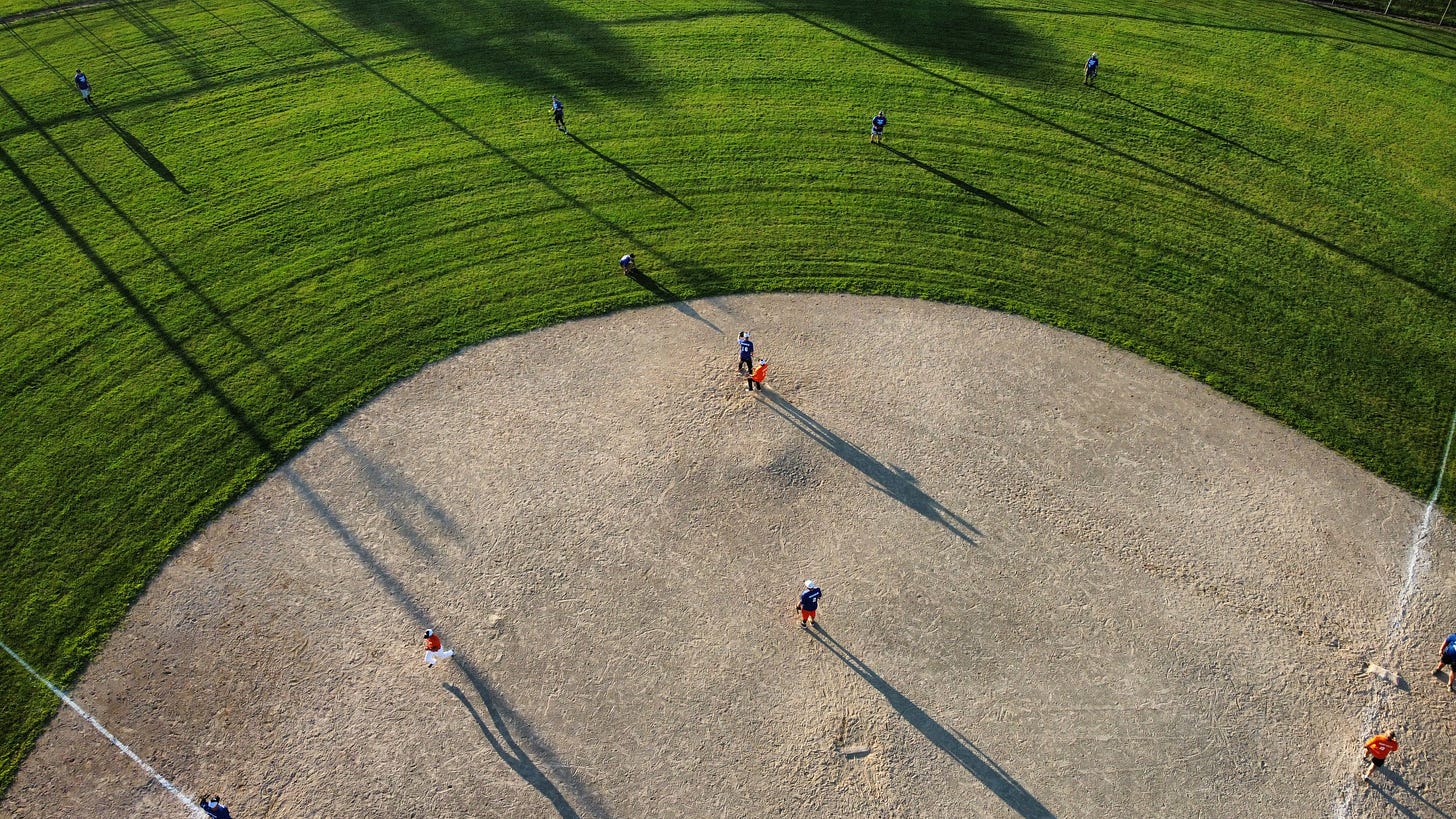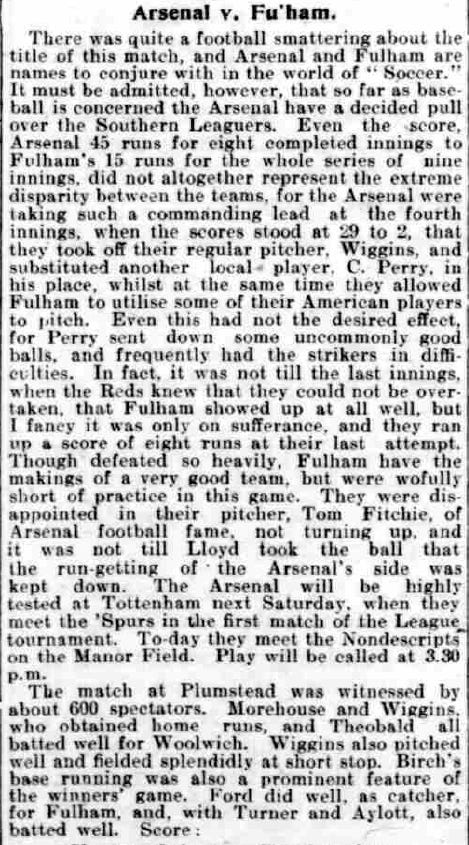Arsenal 16, Tottenham 7
Part two of the story of London’s short-lived baseball league. The inaugural season begins, and Woolwich Arsenal are flying.
I may be wrong, but I seriously suggest that baseball will supply the public with the spectacle for which they hanker during the summer months. The experiment about to be tried will be watched with interest.
Baseball has for generations claimed so large a share of the attention of the athletic-loving section in the American community that the game must have inherent qualities that will appeal to Britishers, for in all matters pertaining to sports and pastimes the two great Anglo-Saxon peoples have tastes that are very much alike.
We shall, it is to be hoped, always stand loyally by cricket as our national game, but in so doing we may also adopt the pastime that has been brought to such a state of perfection by the genius of our trans-Atlantic cousins.
(‘Augur’ writes in The Sporting Life, 13 April 1906.)

The early June sunshine beams down on a small but excitable crowd on Plumstead Common.
The date is 2 June 1906, and Woolwich Arsenal Baseball Club is about to play its first home game. Fulham are the opponents, and expectations are high.
With Arsenal director Arthur Kennedy taking a leading role in running the British Baseball League, it’s unsurprising that the players have taken so quickly to the new sport. A mix of local recruits and members of the football club have already overwhelmed the Nondescripts in a warm-up game by 29 runs to 3 at a game played at West Ham’s Memorial Ground.
There is something phenomenal about a score like that, for close fielding scarcely ever permits of more than half the runs put on by the Woolwichers being gained by one side. The inference is that the Nondescripts did not prove themselves such wonderful fellows as they would like to think themselves.
There was a notion out West Ham way that they were going to be the dons of London. There were to be no flies on them, if you please. And then to get such a wiping out! It was too funny.
(From a match report by ‘The Pitcher’, Kentish Independent, 1 June 1906)
The teams take the field, and the Plumstead regulars spot Steve Theobald leading the team out. The shape of his bat seems odd to those new to this particular sport, but Theobald swings it confidently as he warms up.
Theobald is a fullback who played 24 first-team league games for Woolwich Arsenal and 62 in all competitions between 1901 and 1909. He was captain of the reserve team for a period, and toured Europe with Woolwich Arsenal in 1907, featuring in at least four games. The Arsenal History website has a great profile of Theobald written by Mark Andrews.
Fulham were expecting to call on another Arsenal football man, Tom Fitchie1, but he was unavailable having briefly returned to his native Scotland. Fitchie was a classic journeyman amateur footballer, and played for several different London clubs including Arsenal, Tottenham, Fulham and London Caledonians between his work commitments as a commercial traveller. He was apparently Arsenal’s first Scottish international, having picked up his first of four caps in 1905.
As 3:30pm ticks by, the umpires signal for the first pitch. Wiggins, the Arsenal pitcher and a baseball-specific local recruit, has clearly been practicing and frustrates the Fulham batters with some clever balls.
With the bat, it quickly becomes clear that Woolwich Arsenal have taken to this game much quicker than their opponents. Wiggins hits a home run early on, demonstrating the huge hits much celebrated by American fans of this sport.
Theobald’s pre-game confidence is backed up with some good hitting, and another local recruit, Morehouse, adds another home run. After four innings the result seems inevitable, with Arsenal leading 29-2.
For the final couple of innings, Wiggins is given a rest and the reserve pitcher, Perry, steps up. He still keeps a cap on Fulham’s scoring and it isn’t until the ninth inning that the visitors get up any head of steam. This is despite Arsenal letting Fulham field several Americans, who are decidedly more familiar with the game.
Arsenal start to flag towards the end and Fulham’s reserve pitcher, Lloyd, restricts the scoring in the eighth inning. It barely matters, as Arsenal’s early dominance has done such damage that they don’t need to play the ninth.
Final score: Woolwich Arsenal 45, Fulham 15.
Across London, Clapton Orient and Nondescripts have gone even more run-crazy, with the Orient eventually winning 44-39 – an astonishing 83 runs in total across 18 innings.
As any fan of US baseball will know, a high-scoring Major League game would maybe see 20 runs scored. In 1906, for example, the two teams that battled it out for the World Series title – the Chicago Cubs and the Chicago White Sox – averaged 3.77 and 4.64 runs per game respectively over the course of the season.2
It’s nothing if not entertaining, even if the scoring is more akin to rugby than baseball. Confidence is high for this final round of practice games.
Next weekend, 9 June 1906, is the real thing. The first British Baseball League is about to begin.
Woolwich Arsenal vs Tottenham Hotspur
What better way to start a league season than by walloping Spurs?
Will nothing stop them?
Will nothing stop these Arsenal fellows from winning games? Tottenham are their latest victims and they thrashed them on Saturday afternoon, 16 to 7.
It was the first Saturday in the new formed League, and there were suggestions about that the Spurs, playing at home, would prove too much for the Reds.
The home team went in first and got four, but when the Arsenal got to work they speedily made things hum, and very soon overhauled their hosts.
(from the Baseball Notes column, by ‘The Pitcher’, in the Kentish Independent, 15 June 1906.)
Arsenal got off to a slow start and were 4-0 down after the first innings, However, they then restricted Spurs to just one run from their next four innings and turned the game on its head in the fifth, scoring five times to make it 7-5.
Spurs could only add two more runs in the eighth, by which time Arsenal had added another five. Four more for the Gunners in the final innings was enough to see off any challenge that might have remained from their hosts.
The Woolwich Herald’s writer was far less enthused than his counterpart at the Kentish Independent. On the same day as the above match report appeared, a short item on page 4 of the Herald stated:
The renewed attempt which is being made to popularise baseball in England does not appear to be succeeding any better than the former effort. At the same time, the Woolwich Arsenal team is a good one, and it won’t be their fault, or the fault of those enthusiastic gentlemen who are interesting themselves in the subject, if baseball does not ‘take’ in Woolwich. On Saturday the Arsenal defeated Tottenham Hotspur, at Tottenham, by 16 runs to 7.
(From the Woolwich Herald, 15 June 1906.)
Never mind the odd cynic. Woolwich Arsenal were off to a winning start, and more good times were ahead.
Notes: All newspaper cuttings sourced from the British Newspaper Archive.





